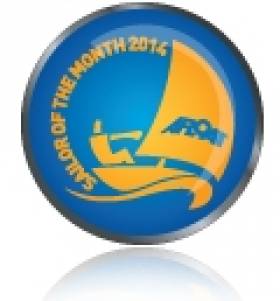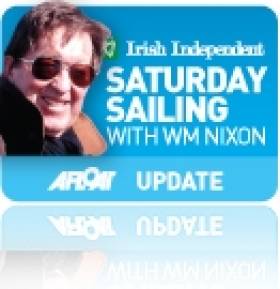Displaying items by tag: Student sailing
National Yacht Club to Host Second Annual Student Match Racing Invitational This Month
Following the success of last year’s inaugural event, the National Yacht Club will host the second Student Match Racing Invitational in Dun Laoghaire on the weekend of 23–24 March.
The meet — comprising round robins, a knockout series and finals racings — will bring together the top student sailors in the country in an exciting weekend of match racing, adding the discipline to the already packed university sailing calendar.
See the Notice of Race on the NYC website ahead of the issue of invitations by Friday 15 March.
Skipper Loghlen Rickard with crew Oisin Cullen and Kate O’Connor on UCD 2 were the victors in the National Yacht Club’s inaugural Student Match Racing Invitational, which took place in Dun Laoghaire last weekend 1-2 April.
The event brought six collegiate team from around the island of Ireland together to compete in some very close and competitive match racing over the weekend.
Saturday brought a calm 10-15 knots with overcast skies along with a double round robin. TUD were leading on eight points after a dominant performance, narrowly losing just two races on Saturday.
UCD 1 and UCD 2 were tied on six points with UCD 1 taking second place on count back due to their two wins over UCD 2 in the round robin. Queen’s University Belfast (QUB) completed the top four teams going through to the next stage on Sunday on 5 points.
While the University of Limerick (UL) and Munster Technological University (MTU) displayed some very competitive match racing, they were unfortunately the bottom two placed teams and did not make it to Stage 2.
Sunday morning brought a two-hour postponement in order to wait for a sea breeze. Then the quarter finals took place in the form of a round robin between the remaining four teams. UCD 1 won every race in this round, giving them the right to pick who they faced in a best-of-three semi-final. UCD 1 picked UCD2, with TUD facing QUB in the other semi-final.
A close and competitive UCD semi-final saw UCD 1 win the first match. Tensions rose in the second when UCD 1 did not enter on the correct side, leading to a UCD 2 protest and causing UCD 1 to incur a penalty that cost them the match.
With UCD 1 back to the favoured starboard entry in the third match, the pre-start was close and both boats started even off the line and converged again at the windward mark, remaining close on the downwind and rounding the leeward gate at the same time.
Ultimately it came down to one mistake from UCD 1, as going left on the upwind proved to be unfavourable. With UCD 2 going to the favourable right side, they came around the windward mark several seconds ahead of UCD 1. UCD 2 went on to win the match and their semi-final.
QUB faced TUD in the other semi final, with tight racing throughout the pre-start and the race leader changing several times each race. Queen’s beat TUD in two straight matches, securing their place in the finals against UCD 2.
The Belfast team proved to be a worthy adversary to UCD 2, and certainly not one to be underestimated. Ultimately it came down to who would lead back to the start line first in the pre-start in the light conditions, with UCD 2 being successful in the first match and going on to win it.
QUB manoeuvred themselves in order for them to be the first to turn back to the start line, allowing them to go on to win the second match. In match three, UCD 2 were able to best QUB once again — match point.
In match four, UCD 2 started in a favourable position tight to leeward of QUB, forcing them to tack off to the lighter right side of the course. This proved to be decisive, with UCD 2 remaining narrowly ahead of QUB for the remainder of the race and ultimately going on to win the race and the event.
“An event like this would not be possible without the volunteers that give up their time to allow this event to be a success,” the NYC said. “A huge thank you to race officer Tadgh Donnelly along with his team: Peter Sherry, Rosemary Cadogan and Mary Gorman.
“Likewise, match racing would not be possible without an umpire team, thank you to Ailbe Millerick, Gordon Davies and Dan Little as well as all who helped them throughout the weekend.
“Congratulations to the winning skipper Loghlen Rickard, along with crew Oisin Cullen and Kate O’Connor.”
More images of the weekend’s racing action can be found on the NYC website HERE.
As previously reported on Afloat.ie, the National Yacht Club’s inaugural Student Match Racing Invitational is taking place in Dun Laoghaire this weekend 1-2 April.
The event brings together the top varsity sailors in the country in what promises to be an exciting weekend of match racing, adding the discipline to the already packed university sailing calendar.
See the Notice of Race and Sailing Instructions, as well as the list of entries and updated race results.
National Yacht Club to Host First Student Match Racing Invitational
Dun Laoghaire’s National Yacht Club has announced it will be hosting its first Student Match Racing Invitational on the weekend of 1-2 April.
The Student Match Racing Invitational will bring together the top varsity sailors in the country in what promises to be an exciting weekend of match racing, adding the discipline to the already packed university sailing calendar.
The event will include round robins, a knockout series as well as finals racing.
The Notice of Race is available from the NYC website and university teams can register their interest HERE.
Simon Doran is Sailor of the Month for March
#sailorofthemonth – Simon Doran of Courtown SC sailed his fourth intervarsities for UCD in Wexford five weekends ago, and played a key role in bringing the Dublin College in as Irish Champions for 2014. The name Doran will not disappear from the UCDSC listings, however, as his younger brother Philip was also a member of the winning team, and he will be taking over the baton of carrying the family name in intervarsity sailing in the years ahead. The next contest will be the historic Sailing Colours Match between UCD and TCD on the Liffey from the MV Cill Airne in the heart of Dublin on Saturday April 12th with the first race at 10.0am.
While we particularly honour Simon Doran for his continuing high-achieving input into student sailing, it should be acknowledged that this year's Irish Open Nationals was successfully sailed despite a period of meteorological mayhem, so it was a true team effort at all levels afloat and ashore. And thanks to sound decisions by race officers Aidan MacLaverty and Dave White, as well as the hospitality and versatile sailing water provided by Wexford Harbour Boat Club above the bridge on the Slaney Estuary, a full programme was put through for the hard-worked and well-reefed Fireflies, which continue to give sterling service as the boat of choice for team racing.
The full team which took the title for UCD were Simon Doran & Jan Dolan, Philip Doran & Bella Morehead, and Conor Murphy & Eimear McIvor. And while of course this monthly award is for the sailing achievement, we'd also like to praise all Ireland's college sailors for their spirited turnout in full black tie mode for their annual dinner in mid championship.
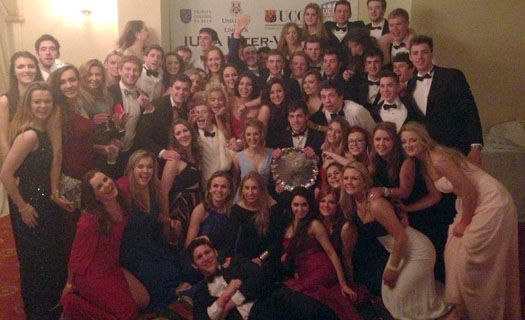
The Irish Varsities ball was held in Wexford as part of the IUSA Championships
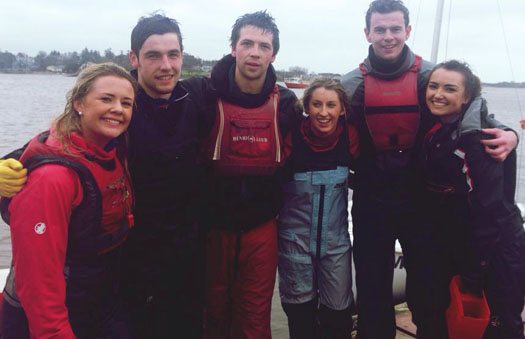
The winning UCD team celebrate their Varsity title
It had a wonderfully cheering effect on the entire sailing community at a time when most of us were more concerned by wondering if our boats would be blown over in the boatyard, or if the roof would come off the house, or if not, then would the house be flooded out?
Student Sailing Worlds Selection Trials Conclude
#sywoc – There are two distinct strands in Irish university sailing these days. The annual National Team Racing Opens in Fireflies – won five weeks ago on Tralee Bay from 26 college teams by University of Limerick skippered by Ross Murray – continues to be the backbone of the national students' programme. This is as it should be. Team racing is a natural fit in college life, but it's equally natural that afterwards, most folk grow out of it.
However, with the success in recent years by the Irish colleges in the Student Yachting Worlds in France in the last week of October, this major international championship with one keelboat apiece has zoomed to the top of the agenda. With the availability of the SailFleet flotilla of J/80s, the top Irish college sailing clubs are able to have a proper selection series with fleet racing which emulates the championship itself, especially this year as J/80s will also be the boat used in France in six months time.
On top of that, University College Dublin are current world champions, and they have a place at the worlds as of right. So there has been a second team place in France up for grabs in a three day selection series spread over three weekends, concluding today in Howth where the J/80s are based this Spring.
The Student Worlds is a massive season-long commitment for a transient membership college sailing club to make, but they mustered seven teams at mid-series with UCD:Simon Doran; TCD:Scott Flanigan; UL: Rob O'Leary; DIT: Nessa Coady; CIT: Donough Good. Seventh team DCU, skippered by Ryan Scott, had already committed to a team racing series in France on the first weekend when this three-Saturday schedule for April was announced, so they've been allowed to compete the latter two weekends with average points allowed for their no-show first day in a series which will have no discards.
However, University of Limerick continue on a roll, and their helmsman Rob O'Leary only has to make sure he doesn't record a last place in either of today's two races to ensure that UL will be providing a two-pronged attack for Ireland along with UCD at the big one in France in October.
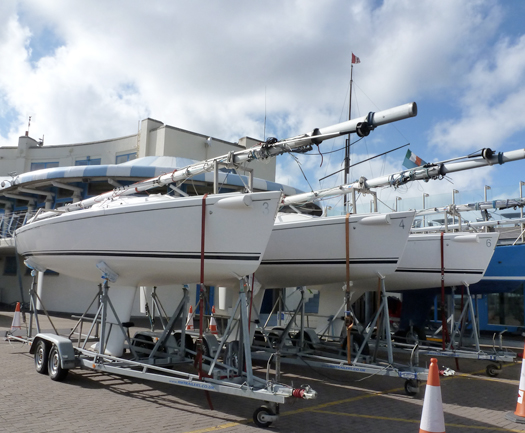
The People's Boats – the ISA SailFleet J/80s are a matter of quiet pride for the sailing community, successfully fulfilling their important role at key sailing centres Photos: W M Nixon
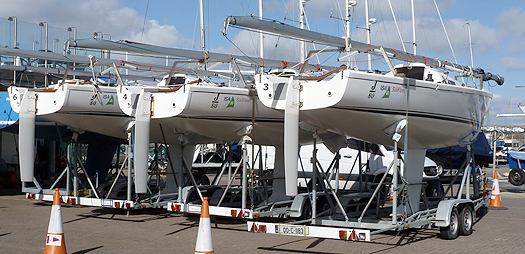
Tomorrow, the J/80s are back in action with the ICRA training day, and it's good to see them doing what they're intended for. The SailFleet concept is achieving exactly what everyone hoped, and we can be proud of them – they're The People's Boats. That said, we may need to organise some sort of fund-raising do - a gala dinner might fit the bill – to put right a problem with ISA SailFleet J/80 No 4. At least two bolts in the upper rudder gudgeon on the transom are producing an unsightly stain. Of course it can't be rust. It just can't be rust. It must be a stain of some sort. But nevertheless, a focused fund-raising drive may be necessary to raise the resources to replace those bolts with fastenings in proper naval grade SS 316. It's the least we can do for The People's Boats.
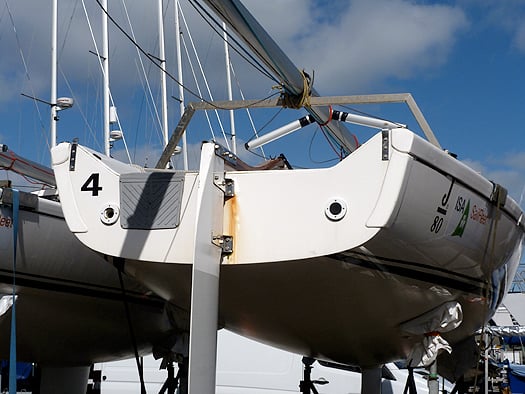
It just couldn't be rust....but this stain needs some SS 316. Photo: W M Nixon
UCD are Sailors of the Month for November
#ucd – Never before have we had ten Afloat.ie/Irish Independent "Sailors of the Month" in the one month. But with Christmas approaching it's time for gifting all round, and the adjudicators have agreed the entire UCD team that clinched the Student Yachting Worlds in France four weeks ago are Sailors of the Month for November.
UCD Sailing Club Captain Cathal Leigh-Doyle made best use of the extensive resources of talent available in Ireland's largest university by taking along a squad of ten, even though the boats used are actually raced by eight.
Ever since they won the right to represent Ireland by taking the national college title in Dun Laoghaire in March, the UCD club's key officers had been keeping an intensive training programme on track. They'd also copped on to the significant fact that you're allowed to deploy substitutes, massively important when the high-scoring overnight offshore race followed immediately after a day of intense inshore contests.
With the points table at a crucial phase, sailing skipper Aidan MacLaverty and tactician Barry McCartin were able to bring on board the fresh energy of the highly experienced Ben Fusco and Ellen Cahill for the marathon overnight contest, and this made for the key contribution to the massive points lead with which the Irish team clinched the world title.
The complete team were Cathal Leigh-Doyle, Aidan McLaverty, Barry McCartin, Ben Fusco, Ellen Cahill, Simon Doran, Bella Moorehead, Alyson Rumball, Theo Murphy and David Fitzgerald, and they did us proud.
FASTER, FASTER...
Speed is of the essence in global sailing at this time of year, with conditions at their best in the world's favoured location for those extreme extra knots, Walvis Bay in Namibia. Where everyone once dreamed of breaking the 40 knot barrier, and then the 50 knots, now we're looking at 60, and the focus is shifting from kite-sailing back to boats.
Presumably the reason is once a kite surfer get beyond, say, 55 knots, they're not really on the water at all. And anyway, without the protection of some sort of hull, speeds of this nature are highly dangerous – we're pushing towards a hundred kilometres per hour, and at those speeds the sea becomes a very unforgiving surface – you need a boat of some sort around you.
But they're not boats as we know them. When Australian inventor Paul Larsen appeared at the Weymouth Speed Week with his first SailRocket just ten years ago, he struggled to get past 30 knots, but even then his boat was off the wall, more a sail-machine than a boat. Now with SailRocket2 and perfect sailing conditions at Walvis, the veteran speedster has this week been able to claim an officially recognized record of 59.38 knots, and it is known that he has been sailing better than 65 knots.
It's all very well so long as the old engine holds together. But with the new generation of 72ft America's Cup catamarans showing how easy it is to go into widow-making cartwheels when you push the speed up to just 45 knots, these guys have clearly gone beyond being sailors – they're test pilots, and with a Kamikaze flavour too.
Certainly some seasoned observers of the America's Cup scene are seriously worried about the danger the new AC boats pose to life and limb. Most folk assume that with a capsize, you have a soft landing with so much water about. But the reality is that with the oversize dimensions of the new generation of America's Cup cats, if there are any breakages a crewman falling from the outermost part of the stern onto the wing mast can have a direct drop of 35 to 40ft, and if he lands on splintered carbon there's lethal potential for injury.
GALWAY ON THE MARCH
It looks increasingly unlikely that Galway will be a host port for the next edition of the Volvo Ocean Race, with the deadline of December 7th for making a soundly-based proposal looming up while too many issues still remain unresolved from the last time round.
Already in Galway you sense a mood of moving on, and the acclaimed honouring of NUI Galway's Reflex 38 as the ICRA Boat of the Year is a reminder that there is offshore campaigning from Galway in other areas of sailing, and it was very much there - and nationally recognised - before the Volvo circus came along.
At the presentation of the award, the boat's owner Martin Breen – a key player in the "alternative Galway" offshore racing scene – was inspired to assure everyone at the ICRA AGM that, come June, "everything that floats in Galway will be at Fenit for the ICRA Nationals".
And Nobby Reilly, the new ICRA Commodore, fondly recalled those halcyon days when the GK 34 Joggernaut, owned and campaigned out of Galway Bay SC by Donal Morrissey and his team, was a regular and successful performer in a huge variety of offshore events in Ireland and abroad.
What the rest of Ireland may not know is that the Joggernaut team syndicate is still very much in action, operating on two fronts. They have a cruising ketch, the 48ft Rebound, which is kept busy in many cruising areas, and for "a spot of sport at home", they have the Dubois 34 Nowhat, a speedy machine which was very much in the hunt when the team went forth with other Galway Boats to Calves Week in West Cork back in August.
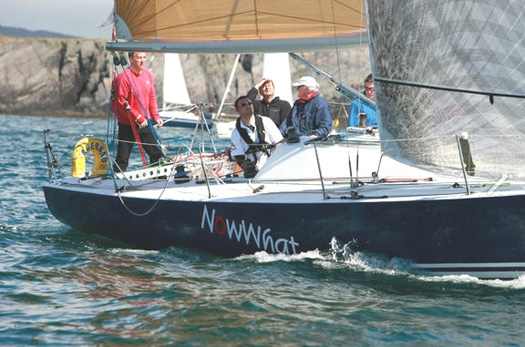
The Joggernauts of Galway are still very much at it – seen at Schull during Calves Week 2012 racing their Dubois 34 Nowhat are (left to right) Barry Heskin, Declan Killilea, Robert McDonagh, Donal Morrissey and Declan Mahon.
NATIONAL 18s COME TO DUBLIN BAY
It was a brilliant move to invite the extraordinary National 18s out of their Crosshaven stronghold to stage their annual championship in Dun Laoghaire at the National YC in the middle of June next year. In the week after the Dun Laoghaire to Dingle Race, and with the offshore brigade in strength at Tralee Bay, the current Mitsubishi Motors "Club of the Year" would otherwise be quiet enough at the time. But everything we know about the National 18s suggests that any risk of an unseasonal easing of the sailing and social pace has now been very effectively blown away.
They're great boats, and great people sailing them. So vigorous is the class spirit in Crosshaven that back in 1994, they inspired the creation of the 1720, which was envisaged as a 26ft keeled version of the National 18. As the boom years arrived, the 1720's demand for a crew of five was difficult to meet, everyone had boats, so the SB3 (now the SB20) was created as a little sister. But with recession upon us, the quite complex SB20 has – at the very least – paused for breath. So now we've come full circle, the focus is back on the National 18 as a three man boat which can function within a manageable budget, and who knows what will come of the class putting in a gallant show in Dun Laoghaire.
Time was – as the item in this website yesterday recalled – when there was a class of National 18s at Skerries. And way back in the 1930s, there were three pioneering boats at Howth trying to inaugurate a class of large dinghies, for this was before the Mermaids started gathering strength.
But the class at Crosshaven was always in a league of its own in terms of vitality, and curiously enough their strongest National 18 links were at the other end of the Cork-Swansea ferry, where there was a thriving class at the Mumbles Sailing Club. The inter-club contests at both centres involving the Royal Munster (as it was then) and the Mumbles were epic. These days, you might be lucky enough to get some venerable and ever so respectable pillar of Cork society to unwind a little as he happily remembers those expeditions to Welsh Wales, and the return visits by the Welshmen complete with their choirs.
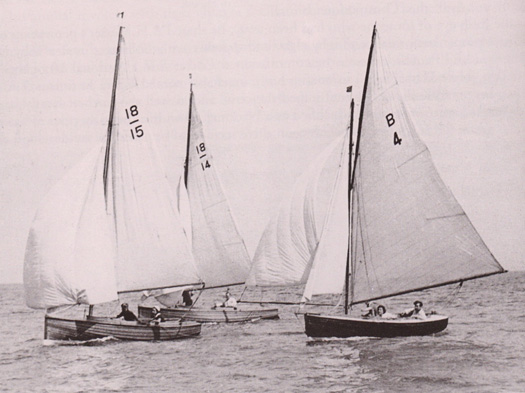
Howth Regatta 1939, with two of the pioneering National 18s of the Uffa Ace design racing with a similarly-sized Essex One Design which had been imported in the hope of establishing a class of large dinghies. The leading National 18 is helmed by Aideen Stokes, while Artie Corbett helms the Essex OD. Photo: W N Stokes


























